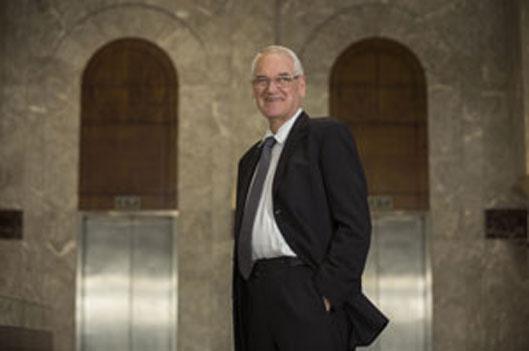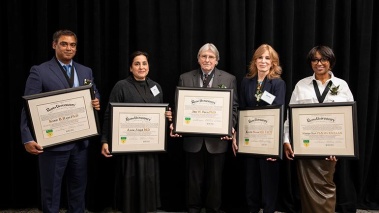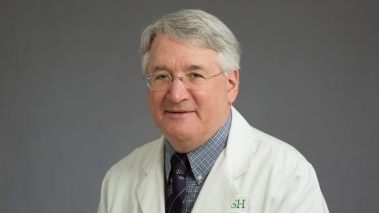Denis Evans, MD, honored by Rush and Alzheimer’s Association
Denis Evans, MD, is unassuming about his research in Alzheimer’s disease. He allows that he has contributed a "recognizable piece" of what is known about Alzheimer's. In truth, his work has been foundational in the battle against the devastating neurological disease of aging, which is the most common cause of dementia.
The director of the Rush Institute for Healthy Aging for two decades, Evans has tracked Alzheimer's for more than a quarter century through population studies — that is, studies of a group within the general population — that have revealed the disease's troubling prevalence among the elderly and illuminated some of the characteristics and behaviors that can influence who develops Alzheimer’s, and who doesn't.
“He’s a pioneer in community-based studies in Alzheimer’s research,” says David Bennett, MD, director of the Rush Alzheimer's Disease Center, who regards Evans as his mentor. Bennett adds that Evans’ approximately 340 research publications are “some of the most highly cited” in field.
Reflecting the importance of his contributions, Evans received the Bengt Winblad Lifetime Achievement Award in Alzheimer’s Disease Research from the Alzheimer’s Association in 2016. The Alla V. and Solomon Jesmer Professor of Medicine at Rush Medical College, Evans retired June 30 after 27 years at Rush and is being honored at a Sept. 5 celebration on the Rush campus.
Researching Alzheimer’s door-to-door
As a young researcher, Evans was part of the team from the Harvard University Medical School that showed in 1989 how widespread Alzheimer’s is in the population — and how steeply its presence increases with age. Working through the East Boston Neighborhood Health Center, the primary source of health care for the neighborhood around Boston’s Logan Airport, the researchers found that Alzheimer’s prevalence increased with age.
The researchers interviewed 81 percent of East Boston's residents aged 65 and older, more than 3,623 in all, and made a detailed clinical evaluation of a random sample of nearly 467. They found that 3 percent of people ages 65 to 74, 19 percent of ages 75 to 84, and 47 percent of those older than 85 had the disease. “The disease was a good deal more common than people thought,” Evans says.
What Evans understood from his beginnings at Harvard, Bennet says, is that studying demented people who showed up at health care facilities would not uncover the causes of Alzheimer’s, while many others who had the disease remained out of sight in their communities. Instead, Evans identified risk factors among the population as a whole, went door-to-door in a confined area to find all the clinically normal people on the brink of old age who lived there, followed up to observe which ones eventually became demented, and focused on the risk factors that had been noted in individuals who later lost cognitive functioning.
Seeing the spectrum
One of Evans’ great talents, Bennett says, has been the ability to “design the right study to answer the questions.”
Bennett also explains that Evans took an unusual approach to Alzheimer’s for a 20th-century researcher: He treated the disease as if it were a spectrum disorder.
“Denis understood very early on that there is no magic cut point for Alzheimer’s disease,” Bennett says. He realized the disease’s presentation is different in every person who has it. “It’s taken all these decades for the field to catch up to him,” Bennett says.
'I fell in love'
Born and raised in Detroit, Evans attended Catholic University in Washington, D.C., and the University of Michigan Medical School in Ann Arbor. He started his medical research career in infectious diseases at Harvard University Medical School in Boston. As a junior fellow there, he agreed to help his mentor, Edward H. Kass, MD, PhD, conduct a population study around treatments for urinary tract infections.
"He'd been very good to me, and he hadn't asked me to do much, so I agreed to do it. Well, I fell in love with population-based research. My interests began to switch," Evans recalls.
It took Evans another decade to turn fully away from infectious diseases. He kept encountering patients who "were telling me they would rather be dead than have what is now called Alzheimer's disease. I thought, 'Well, that's important!'"
The Chicago way
He came to Rush in 1990, attracted by its research reputation, its established cohorts, and by the city of Chicago. It was one of perhaps four metropolitan areas, he figures, where he could conduct a population study he had in mind. In Chicago, Evans found the “level of trust and cooperation” and the diverse communities in close proximity to one another that made it possible to explore differences in how Alzheimer's affects different ethnic groups.
That enterprise became the Chicago Health and Aging Project, a study of the chronic health problems of the elderly — especially of possible risk factors for Alzheimer’s — in an area on the far South Side with both white and African-American residents. A longitudinal population study, meaning it observed the same subjects repeatedly over time, CHAP began in 1993 over the next 20 years canvassed about 70 percent of the people in the Mount Greenwood, Morgan Park and Washington Heights neighborhood — more than 10,000 people in all.
“The CHAP study has been important in estimating the number of people who have Alzheimer’s disease in the general population, in energizing methodical investigation of the disease among African Americans, and in uncovering several factors that give rise to increased risk of the condition,” Evans says.
Evans’ work with CHAP has continued since the study ended in 2012. He is the principal investigator of the Genetic Epidemiology of Cognitive Decline in an Aging Population Sample study, which is investigating the genetics of late-life cognitive decline using data from two large cohort studies — CHAP and the Indianapolis-Ibadan Dementia Project, a comparative study of African-Americans in Indianapolis and Yoruba in Nigeria.
The study has helped delineate the genetic architecture of Alzheimer’s disease and cognitive decline among African Americans and in comparing these finding to those of European Americans.
Sharing success
When Evans first came to Rush, Bennett recalls, “there was very little research on Alzheimer’s disease happening” there. Thanks to his skill at writing successful grant applications to the National Institutes of Health and his willingness to share what he knew, Rush quickly became a major Alzheimer’s research institution.
“By 1991, we had a center funded by the National Institute on Aging,” Bennett says. “By 1993, he had CHAP and other grants, and he had a big coattail effect on research across the institution.”
While understanding of Alzheimer’s disease has increased exponentially during Evans’ career, a cure for it still remains elusive. Whatever progress will be made in conquering Alzheimer's disease in the near future will likely come from prevention rather than a cure. Otherwise, if we live long enough, “most of us will develop Alzheimer's disease,” Evans says, since medical science is extending lifespans in developed countries.
"There's more frustration than good news,” Evans acknowledges. “It would help if there were only a few factors that account for a lot of the disease, but Alzheimer’s is turning out to be very complex, and complexity is the enemy.
“We will eventually have success, but it won't be tomorrow," he says. As Evans’ own achievements have shown, a solution to the disease requires being in the fight for the long term.







